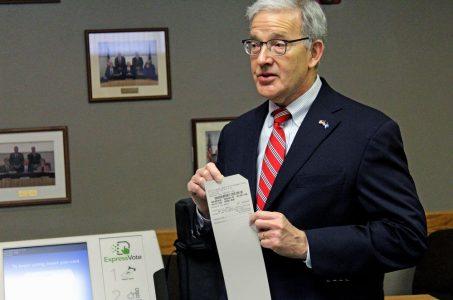Bob Baffert’s Lawyer Says Latest Drug Test Clears Trainer and Kentucky Derby Winner
Posted on: December 4, 2021, 10:56h.
Last updated on: December 6, 2021, 08:31h.
The lawyer for Bob Baffert said results from a drug test on 2021 Kentucky Derby winner Medina Spirit show that the horse was not injected with a version of betamethasone, banned under the state’s racing rules.

Craig Robertson issued a statement late Friday evening saying results of a drug test ordered by a Kentucky judge prove the corticosteroid entered the horse’s system through the use of a topical ointment. He added that the colt’s veterinarian ordered its use.
In other words, it has now been scientifically proven that what Bob Baffert said from the beginning was true – Medina Spirit was never injected with betamethasone, and the findings following the Kentucky Derby were solely the result of the horse being treated for a skin condition by way of a topical ointment,” Robertson said.
Seven months ago, Baffert shocked the sports world. That’s when he announced a week after Medina Spirit gave him his record seventh Kentucky Derby win that the horse tested positive for betamethasone. During that initial press conference, he said the horse had never been treated with the substance. But he came out with another statement two days later revealing the vet’s use of a topical ointment that contained the drug to treat a skin condition first discovered a month before the Derby.
Extra Tests Resulted from Lawsuit
The failed drug test has put Medina Spirit’s Derby win in jeopardy, as he faces disqualification. That would also lead to Baffert facing punishment, including the possibility of suspension by the Kentucky Horse Racing Commission.
After the split sample also found the anti-inflammatory drug, Baffert and Medina Spirit’s owner filed a lawsuit in June against the KHRC. They requested additional testing of the split urine sample taken from the horse after the Derby.
In that case, Franklin Circuit Judge Thomas Wingate ordered Baffert and Zedan Racing Stables to get 20 milliliters of the split sample, which was to be used at a lab of their choosing, to determine if the substance was betamethasone valerate, the form of the drug used in the ointment. The commission received five milliliters plus whatever was leftover.
Baffert and Zedan Racing selected a laboratory run by Dr. George Maylin that conducts tests for the New York State Gaming Commission’s Equine Drug Testing Program.
Is Injection Only Against the Rules?
The use of drugs in horse racing has been highly criticized for years by animal welfare advocates. Racing operators and regulators took additional steps to reduce drug usage. That’s after as 37 horses died in races and during training sessions at Santa Anita Park from December 2018 to November 2019, racing operators and regulators took additional steps to restrict drug usage.
In April 2020, the KHRC unveiled new guidelines for 2-year-olds racing that year and for horses in all stakes races – like the Kentucky Derby – beginning in 2021. Those rules included a two-week “stand down period” for any intra-articular injection of betamethasone.
The threshold for the drug is 10 picograms per milliliter of blood. Both the initial test and the first test of the split sample found more than double that limit.
Robertson and Clark Brewster, a lawyer for Zedan Racing, point to that language as clearing Baffert and the horse.
“Now there is zero doubt that the 14-day rule some thought might have been violated by the earlier less specific testing is revealed as premature judgment,” Brewster said in a statement. “That groundless accusation is without scientific merit.”
Robertson said that his client has been the target of “an unfair rush to judgment” and that the test results should uphold Medina Spirit’s victory.
We asked all along that everyone wait until the facts and science came to light,” he said. “Now that it has been scientifically proven that Mr. Baffert was truthful, did not break any rules of racing, and Medina Spirit’s victory was due solely to the heart and ability of the horse and nothing else, it is time for all members of racing to come together for the good of the sport.”
It may not necessarily be that cut and dry, though. The same KHRC guidelines allow for the use of topical products as ointments. Those can be applied to “up to the scheduled paddock time,” which is just minutes before a race. However, the topical application cannot “contain steroids, anesthetics, or any other prohibited substances.”
KHRC Executive Director told the Thoroughbred Daily News on Friday that the commission cannot comment on ongoing inquiries.
Baffert Still Suspended by Churchill Downs
Baffert has been punished at least 20 times in his career by racing boards, according to ThoroughbredRulings.com. That includes a disqualification of Gamine, who finished third in the 2020 Kentucky Oaks. Baffert was fined $1,500, and the filly was disqualified from her third-place finish. Her owners forfeited their share of the prize money from one of the top races in the country for 3-year-old fillies.
After Medina Spirit’s drug test, Churchill Downs Incorporated suspended Baffert for two years from its tracks. In doing so, Churchill officials also banned any Baffert-trained horse from qualifying for the Kentucky Derby and Oaks during that suspension. That meant Baffert’s 2-year-old, Corniche, did not earn any qualifying points for his win in last month’s Breeders’ Cup Juvenile at Del Mar Racetrack.
The New York Racing Association, which operates three tracks in that state, also looked to take action against Baffert after the failed test. However, the trainer won an injunction in federal court in July that blocked an immediate suspension.
That case continues, as a federal judge in New York allowed NYRA to hold its own hearing against Baffert in the matter – a step NYRA did not take before unilaterally issuing the suspension.
On Nov. 19, Baffert’s attorney filed an amended complaint in the case, noting that any suspension imposed by NYRA is essentially a suspension from racing in New York. That’s since the organization is the only entity allowed to operate thoroughbred tracks in the state.
Related News Articles
Nebraska Gaming Vote Pushed Forward by State Supreme Court
Golden Gate Field Sues Animal Rights Group for On-Track Protest
Most Popular
Mirage Las Vegas Demolition to Start Next Week, Atrium a Goner
Where All the Mirage Relics Will Go
Most Commented
-
Bally’s Facing Five Months of Daily Demolition for Chicago Casino
— June 18, 2024 — 12 Comments -
Chicago Pension Mess Highlights Need for Bally’s Casino
— July 2, 2024 — 5 Comments
















Last Comment ( 1 )
During this conflict, it bothers me that so many inflammatory terms are thrown around without regard to facts and context. A PICOgram is one trillionth of a gram ... 25 PICOgrams of betamethasone would would not have a whiff of effect on a 1200 lb. horse! There has been a lot of unnecessary drama and inappropriate name calling. Let's stick to the facts, and reserve judgement until all the evidence is fully considered by cool heads.